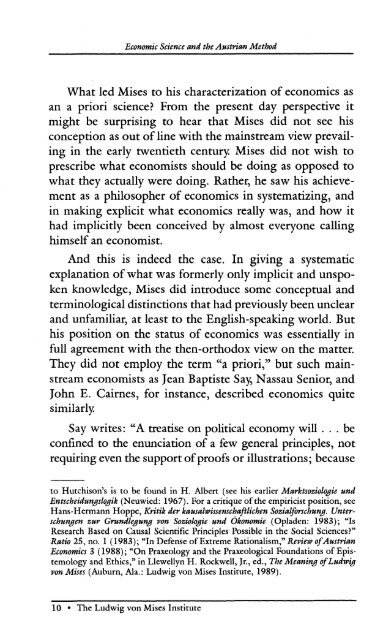Economic Science and the Austrian Method_3
Economic Science and the Austrian Method_3
Economic Science and the Austrian Method_3
- No tags were found...
Create successful ePaper yourself
Turn your PDF publications into a flip-book with our unique Google optimized e-Paper software.
<strong>Economic</strong> <strong>Science</strong> <strong>and</strong> <strong>the</strong> <strong>Austrian</strong> <strong>Method</strong>What led Mises to his characterization of economics asan a priori science? From <strong>the</strong> present day perspective itmight be surprising to hear that Mises did not see hisconception as out ofline with <strong>the</strong> mainstream view prevailingin <strong>the</strong> early twentieth centur~ Mises did not wish toprescribe what economists should be doing as opposed towhat <strong>the</strong>y actually were doing. Ra<strong>the</strong>r, he saw his achievementas a philosopher of economics in systematizing, <strong>and</strong>in making explicit what economics really was, <strong>and</strong> how ithad implicitly been conceived by almost everyone callinghimself an economist.And this is indeed <strong>the</strong> case. In giving a systematicexplanation ofwhat was formerly only implicit <strong>and</strong> unspokenknowledge, Mises did introduce some conceptual <strong>and</strong>terminological distinctions that had previously been unclear<strong>and</strong> unfamiliar, at least to <strong>the</strong> English-speaking world. Buthis position on <strong>the</strong> status of economics was essentially infull agreement with <strong>the</strong> <strong>the</strong>n-orthodox view on <strong>the</strong> matter.They did not employ <strong>the</strong> term "a priori," but such mainstreameconomists as Jean Baptiste Sa~ Nassau Senior, <strong>and</strong>John E. Cairnes, for instance, described economics quitesimilarl~Say writes: "A treatise on political economy will ... beconfined to <strong>the</strong> enunciation of a few general principles, notrequiring even <strong>the</strong> support ofproofs or illustrations; becauseto Hutchison's is to be found in H. Albert (see his earlier Marktsoziologie undEntscheidungslogik (Neuwied: 1967). For a critique of<strong>the</strong> empiricist position, seeHans-Hermann Hoppe, Kritik der kausalwissenschaftlichen Sozialforschung. Unterschungenzur Grundlegung von Soziologie und Okonomie (Opladen: 1983); "IsResearch Based on Causal Scientific Principles Possible in <strong>the</strong> Social <strong>Science</strong>s?"Ratio 25, no. 1 (1983); "In Defense ofExtreme Rationalism," Review of<strong>Austrian</strong><strong>Economic</strong>s 3 (1988); "On Praxeology <strong>and</strong> <strong>the</strong> Praxeological Foundations of Epistemology<strong>and</strong> Ethics," in Llewellyn H. Rockwell, Jr., ed., The Meaning ofLudwigvon Mises (Auburn, Ala.: Ludwig von Mises Institute, 1989).10 • The Ludwig von Mises Institute


